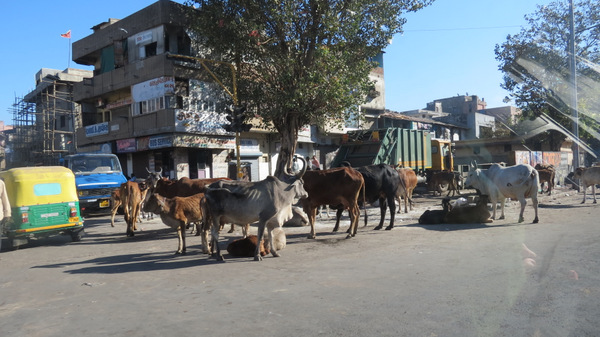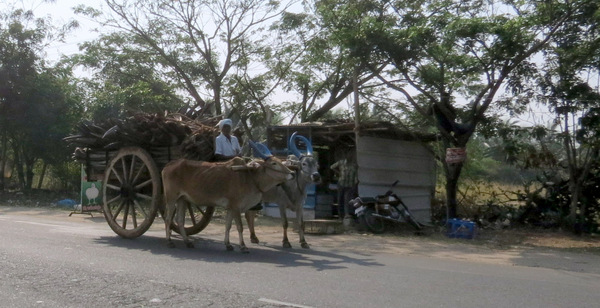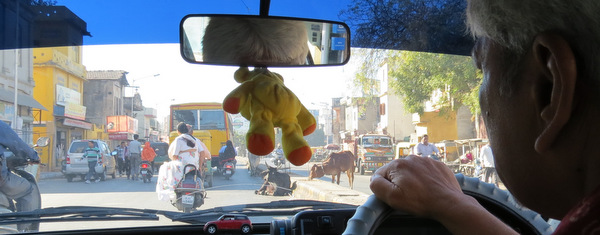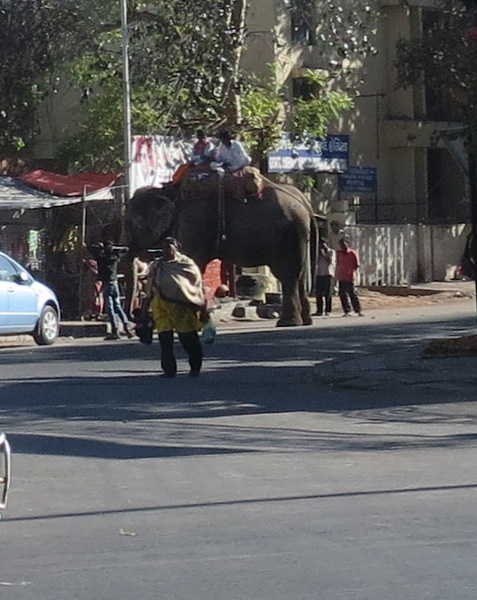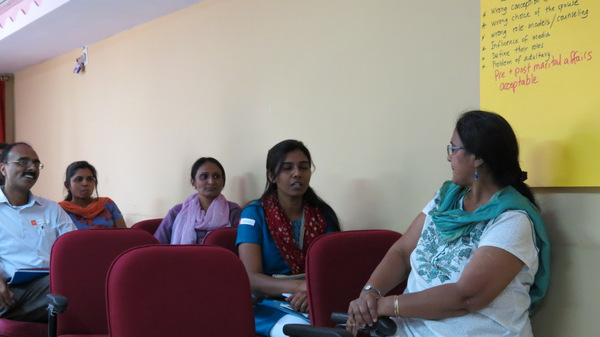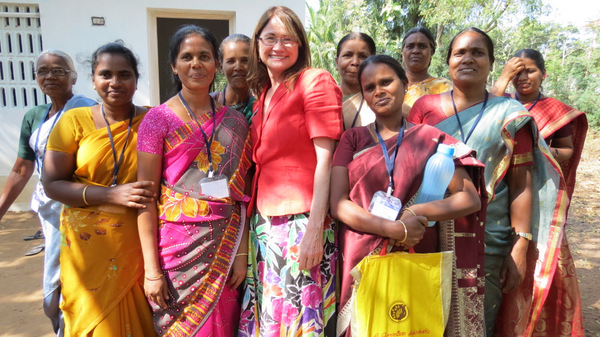by Carrie Miles
Our 2013 program began with some drama, as Donell Peck, who was slated to travel to both India and Africa, tore a muscle in her leg two days before our flights. Donell missed India, but thanks to a lot of prayer on two continents, was able to meet Carrie Miles in Africa.
Minus Donell, Carrie Miles (Orange, California) and David Nutter (Herndon, Virginia) met in Frankfurt, Germany and flew together to Coimbatore, India. There we were met by our host, Dr. W. S. V, who took us to the small town of Pollachi.
We were interested to learn that many of the people in this seminar were the lowest or “untouchable” caste. Even the leaders here are poor, and almost no one spoke English. Pastor Va’s son, Anbarasu, or Anbu, came from some distance to translate for us. We met in a retreat center, now allowed to mostly go to ruin, some distance out of town. The beautiful Pollachi countryside is used for filming Bollywood movies, and we enjoyed the lovely coconut plantations surrounding the center.
During the first day of the seminar, participants everywhere work in small groups through the Genesis material. In Genesis 1, they learn that God created woman as well as man in God’s image. In Genesis 2, that woman was created as a help face-to-face to the man – not as just a housemaid and child bearer. In Genesis 3, participants discover that the man was with the woman during the temptation (Gen 3:6) and that only the serpent and the ground, not the people, were cursed in the Fall.
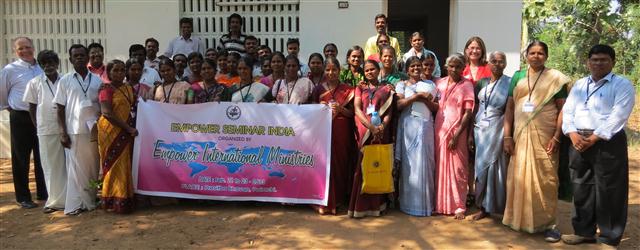 |
By the end of first day, some of the women were in tears. They had been taught from the pulpit, all their lives, that they are the source of all evil, and cursed by God. Imagine, in a culture that practices witchcraft, how it feels to believe that you are cursed by God. As Carrie finished the final debriefing on Genesis 3, she was surprised when the participants began to cheer, “Alleluia! Alleluia! Alleluia!” What good news!
And the men were glad as well as the women. Pastor V remarked afterward that if one preached this message for a year, the men would not have accepted women’s equality and freedom from the curse. With the Bible-study, small group method we use, however, the men understood and accepted this radical new teaching, as they understood just how Jesus frees them as well as women from the cruelty of the belief that God discriminates against people based on caste, ethnicity, gender, or wealth. And with Paul’s emphasis on agape love, affection, and mutual submission, marriage suddenly becomes a whole new experience. Just take a look at the photos of some of the couples to get an appreciation for how life had suddenly changed for the better!
India was an exciting experience for us. David Nutter and I were delighted with the warm welcome and enthusiastic response from both the low caste people in the rural area of Pollachi and from those of the sophisticated urban leaders we worked with in Ahmedabad. One thing we experienced firsthand was that what you have always heard about holy cows in India is true! A cow is considered to be a goddess, and Hindus believe that one receives a blessing for feeding them. Although I believe that people owned and milked the cows, they were allowed to wander freely everywhere and could not be chased away.
Interestingly, while we saw massive bulls pulling carts in Pollachi, I didn’t see cows in the road in town. Maybe in the countryside they had greener pastures to roam (or they just didn’t like all the motorcycles buzzing around).
However, in the very urban business city of Bangalore (where we stayed for two days between programs) and industrial Ahmedabad, cows — with giant horns — roamed the streets freely, browsing among the roadside garbage. Imagine a four lane thoroughfare with four cows lying down in the middle!
The first morning in Ahmedabad, we were stopped at a traffic light, and watched an elephant crossing the intersection. I wasn’t fast enough to get a picture before the light changed. Fortunately, the elephant was out again the next day and we got a photo. Roosters crowing and chickens out on their own are common sounds and sights in East Africa, but we saw no Indians chickens out unaccompanied – maybe because they are not goddesses and have no protected status, so people keep them safely cooped up. A few experiences since we returned home have slammed home to us the meaning of what we heard in India, and what the leaders we worked with there have to combat. First was an article in the LATimes about a hospital in a rural area of Ranthambore, India. The hospital once had a neonatal care unit, but discontinued the program because they found that people would pay only to save boy babies. One woman who gave birth to boy and girl twins there refused to nurse the girl “so the boy ‘wouldn’t get hungry’”. Then there is the movie, Not Today, about the treatment of Dalits (Untouchable or out caste people), that Donell Peck, Linda Crawford and I went to see last week. The story is about a slacker young man who goes to India with slacker friends and encounters a Dalit man and his seven year old daughter, who are living on the street. When the slacker fails to help them as he promised, the man sells his daughter, who was starving to death. The brokers who bought her promised him that she would work as a maid for wealthy people, eat, go to school, and have her own room. Of course the slacker reads up on human trafficking and realizes that the girl will most likely end up in a brothel. He and the father go searching for her. Looking through brothels for the daughter, they end up purchasing the freedom of several other girls, and are immediately faced with the problem of what to do with them. After all, their families sold them because they didn’t want them or couldn’t feed them. But soon the men discover that girls had gone back to the brothel on their own. When the young man (can’t call him a slacker anymore) asks why, the Dalit man tells them that all their lives, these girls’ fathers told that they were no good for anything – so why not go back to the only people who have any use for them? This sad phenomenon isn’t just a dramatization for the movies, and it is not just fathers who have no use for low caste girls. One beautiful and accomplished young woman who attended the Ahmedabad seminar said that her mother used to ask her, “Why should I feed you? You are just going to get married (i.e., you are just a girl).”
You may have read about a young woman in Delhi would got on a bus and who was so violently raped by the men inside, including with an iron rod, that she lost most of her intestines and later died in hospital. This assault and death caused a huge, and well warranted, public outcry. Our host and translator in Pollachi said that things like this happen all the time to Dalit women, but it rarely makes news because no one cares what happens to them. In the first part of the trip report, I told you this story, but it bears repeating here. During the first day of the seminar, participants everywhere work in small groups through the Genesis material. In Genesis 1, they learn that God created woman as well as man in God’s image. In Genesis 2, that woman was created as a help face-to-face to the man – not as just a housemaid and child bearer. In Genesis 3, participants discover that the man was with the woman during the temptation (Gen 3:6) and that only the serpent and the ground, not the people, were cursed in the Fall. By the end of that day, many of the women had tears in their eyes. They had been taught from the pulpit, all their lives, that they are the source of all evil, and cursed by God. Imagine, in a culture that practices witchcraft, how it feels to believe that you are cursed by God. As I finished the final debriefing on Genesis 3, I was surprised when the participants began to cheer, “Alleluia! Alleluia! Alleluia!” These were some very happy ladies.
Telling your daughters that they are not good for anything, and are lucky if they are even fed, is terribly cruel. Preaching from the pulpit that women are the source of all evil and cursed by God is equally cruel. But consider that the low-caste men are repeatedly told by their culture that they were not good for anything either.
The movie, then, was only too true, and made me cry, but I also found it motivating. Having spent the last week and a half trying to sort out the financial records from the India and Africa trips – not my favorite activity — I begin to wonder just why I am doing this. Empower cannot do anything directly to combat human trafficking. We don’t come in with guns, or laws, to stop atrocities like slavery, rape, and genocide. But we offer the powerful scriptural message of God’s love for each of us, regardless of gender, caste, ethnicity, educational or social status. As we led the seminar in Pollachi, I thanked God for providing the story of the Good Samaritan, and particularly thanked God that we have it in the study guide. I thank God that God made us all in God’s own image, that God did not curse us but blessed us, and that he is sending us to the parts of the world that desperately need this message. I also thank God that he sent us with the format we use. Bishop V told us that had we preached that women are not cursed every Sunday for a year, the men would not have accepted it. But because in the seminars they study the Bible themselves, they are convicted, and begin to treat women accordingly. Teaching people about their essential worth, whether male or female, rich or poor, educated or illiterate, powerful or helpless, changes everything. Maybe this message won’t stop those who deal in human flesh, but as the parents hear God’s word, fewer of them will sell their daughters but will feed them instead. And fewer of those sold, understanding their true value, will return to bondage. |
On to Africa
David Nutter and I (Carrie Miles) left India from Mumbai on March 4. David flew home; I went on the Addis Ababa (Ethiopia) to meet Donell Peck and fly on to Kigali, Rwanda.
Donell and I hoped we would meet each other in Addis, anyway. According to the original plans, Donell was coming to India as well as Africa, but she suffered an injury to her leg just two days before we were scheduled to leave. She had to cancel India and at first we thought she would have to cancel the entire trip. But she got the split off her leg and an okay from her doctor to travel in time to join me in Africa. We were both a bit anxious about actually connecting in Ethiopia, though. Fortunately, when I finally got from my Indian flight to the correct terminal in Addis (not a straightforward task), there was Donell, her back to me, watching the far door! We were very glad to see each other.
Donell and I flew into Kigali, Rwanda, Kigali being far closer to where we were going in southern Uganda than Entebbe, Uganda’s international airport. The flight was full, and Donell and I shared a row with a young man going to a village in southern Uganda to do volunteer work. When we landed, I asked him how he was going to get to his village. He said someone was picking him up, but he wasn’t getting off the plane yet but going on to Kigali. I said, “But we are in Kigali.” He said, “We are in Entebbe.” So I looked out the window and saw that we were, in fact, in Entebbe.
I was very surprised, and looked at the print out of my reservation several times. It didn’t mention Entebbe at all and had us arriving in Kigali an hour earlier. Apparently the stopover in Entebbe had been added after I had booked my flight. There is a little circuit that these airlines run: Addis, Entebbe, Kigali, Addis, or in the case of Kenya Air, Nairobi, Entebbe, Kigali, Nairobi; sometimes going clockwise, sometimes counter clockwise. Throw in Burundi and it gets even more confusing. I can’t keep track. Maybe the routes don’t change at all but I suffer from wishful thinking, hoping the flights go first to where I want to go. In any case, most of the people on the flight got off in Entebbe, so I hope they knew where they were. I’m glad I didn’t automatically join the crowd and get off at the wrong stop. In any case, we eventually flew on to Rwanda, a rather short flight, where we were met by Frank Tweheyo, who drove us north to Kabale, Uganda.
| |
| White Horse Inn, Kabale, Uganda |
In Kabale, Donell and I stayed at my home-away-from-home, the White Horse Inn. This is an old golf resort, in urgent need of a good coat of paint, and in some places, glass in the windows, but still comfortable, with bath tubs, hot water, and an electrical generator for when the municipal power goes out. Uganda and Burundi too suffer from a shortage of electricity and so have a policy of “load sharing”, where every area has the power off for part of the day so that other parts of the country can have it on. Sometimes the houses are wired so that certain circuits get the electricity but not others. For example, the lights may be on but not the water heater. In Burundi, I will wake at 2:00 AM to find all the lights on because the power had gone off earlier in the evening and no one had turned off the switches.
| Grounds at White Horse Inn, Kabale, Uganda |
This year, we were especially (and ungenerously) grateful when the power was out in town because this put the broadcasting equipment at the mosque out as well. Either the mosque or the equipment must be new, as I never heard the call to prayers while staying in Kabale before. The muezzin sang for an hour on Friday beginning at 5:00 AM, but our sleep was uninterrupted on Saturday when the power was out. We hope he doesn’t get a generator himself.
Donell and I had rooms with a connecting door between us, which we opened when we were feeling sociable and closed when one of us was snoring (me) or otherwise rattling around (Donell).
| Kabale University Empower chapter |
According to the schedule, we were supposed to have the day after our arrival to rest. But nature and our schedule abhor a vacuum, so we ended up meeting with a group of students at Kabale University. One of our earliest Empower partners in Kabale, Annah Besigye, planned to start an Empower chapter there and wanted us to help her kick it off. We met with the students in the afternoon, and again on Friday. Annah has continued to meet with them weekly, teaching the New Man, New Woman, New Life study guide.
| Canon Gideon presenting the overview sermon |
Wednesday we began the Master Class for the executive committee at Bishop Barham University College. Although my report on this group was minimal last year, due mostly to my losing all the photos I took of them when my camera was stolen in Kenya, it would be hard to overestimate the importance of Empower’s partnership with BBUC. As Archdeacon Ribakare Pontien in Burundi observed, if we can reach young people before they marry, we can affect change very quickly. Having BBUC, which trains many Anglican clergy members, promoting New Man, New Woman, New Life’s Bible-based material is a huge boost for us. Having high-level Anglican clergy and administration/faculty members so invested in the program is also a huge boost. The master class is the fourth program we have done for this group, who are been eager and apt participants. We really love and respect these wonderful men and women, who have a true heart for the welfare of the family. The principal (president) of the college, Professor Manual, was unable to attend the program as he was called away to another very important seminar, but we were fortunate to meet with him before we left.
Canon Jovahn, BBUC master class
|
We were really honored when the college commissioned the graduates of the master class to teach the program on behalf of the university itself!
| Newly commissioned facilitators (not everyone was available during this service) |
We were also delighted to spend two sessions helping Frank Tweheyo kick-off a new Empower student chapter at BBUC. And Donell, Frank and I also did a radio show on Saturday morning. After the show, I was on the sidewalk downtown and a rather large man came out of a shop, pulled me close and pounded me on the back, shouting, “I heard you on the radio!”
| Lake Bunyonyi from the terrace at Birdnest Resort |
In the middle of the master class, Donell and I enjoyed a lovely break when Frank and Phobice Tweheyo took us up to Lake Bunyonyi, the most beautiful place on earth. If you would like to join me in creating a retirement village there, you will not be sorry. We had dinner at Birdsnest Resort, a lovely hotel run by some Belgians.
| The bride and attendants, give-away |
Rev. Patrick Mbasa, one of our Empower team, invited us to his daughter’s give-away on Saturday. The give-away is traditionally the event in which the bride is exchanged for the brideprice. Rev. Patrick renamed “the giving in marriage”. It is a great party whatever way you call it. I attended one on my first trip to Uganda in 2005 and was happy that Donell got to experience one.
| Carrie preaching at BBUC |
I preached twice that Sunday at the BBUC chapel. Following each service, the congregants filed outside and danced! Great fun.
| Celebration at end of service |
The next day, we headed back to Rwanda to fly to Burundi.

